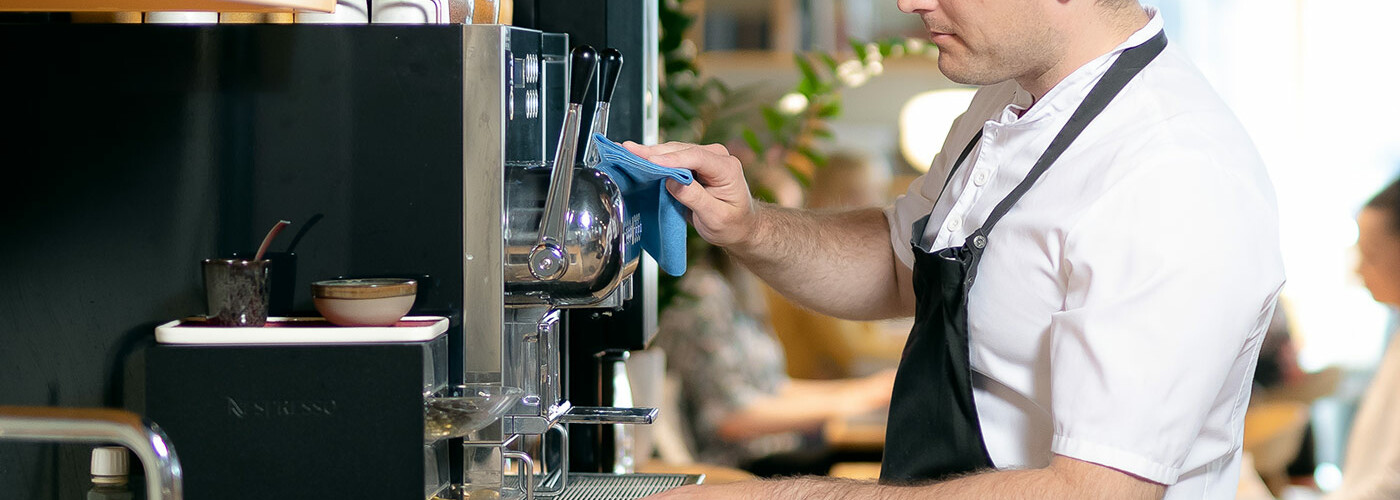A cup to start the morning, a midday break or an afternoon tea – a hot beverage is an integral part of our daily routines. Espresso machines, coffee makers, and thermos flasks easily accumulate residues and deposits, such as coffee, tea, and milk stains, discoloration, limescale, and rust. Over time, these can affect the quality of your beverages. Regular cleaning not only ensures the best possible flavor of your drinks but also prolongs the lifespan of your appliances and components. By using a suitable cleaning agent for coffee makers and thermos flasks, you can keep your devices clear and clean, preventing dirt from becoming ingrained.
How to clean a coffee maker or thermos
Before cleaning, detach all removable parts such as filters, caps, and pots. Add hot water to a glass pot or thermos flask, along with the Kiilto Pro Coffex powder developed for cleansing of coffee and tea equipment (dosage: 5-10 ml per litre of water). When cleaning a coffee maker, the powder should be dosed directly into the water tank (25 ml per litre of water). Allow the solution to work for approximately 10-15 minutes.
After the contact time, brush the surfaces of the thermos with a soft brush. Pay special attention to hard-to-reach areas. Finally, rinse thoroughly with clean water. Do not brush the coffee maker’s water tank, but rinse it thoroughly by draining clean water through it at least three times. If the coffee maker doesn’t clean without brushing, use only a clean or unused brush in the water tank. Lastly, give the pot and the filter holder a wash.
Note: Coffee makers equipped with a cleaning program should be cleaned according to the manufacturer’s instructions.
Removal of lime and rust deposits from a coffee maker or thermos
Regularly perform descaling to prevent the buildup of deposits and maintain the good condition of your appliances. The frequency of descaling your coffee maker or thermos depends on the hardness of water in your area. Kiilto Pro Off Calc is a versatile descaler for professional kitchens. It effectively softens and removes limescale and rust deposits that, when accumulated, hinder the optimal performance of the appliance.
To descale a coffee maker, pour the cleaning solution (dosage: 50 ml per half a litre of water) through the water tank. After the wash, rinse the device by running clean water through the coffee maker. Please make sure to perform at least three rinses to ensure all residues are thoroughly washed away. Lastly, give the pot and the filter holder a wash.
Note: When cleaning the kettle, do not boil water with the cleaning solution to prevent the risk of boiling over.
Don’t forget to clean the outer surfaces of the coffee maker or thermos
To clean the outer surfaces of your thermos or coffee maker, as well as the hot plate, opt for a general-purpose cleaner and a cleaning cloth. For example, Kiilto Pro Superquick Spurt is a suitable choice for various surfaces, including stainless steel, and does not leave a cloudy or gray film behind.
Tip! You can also use disinfectant cleaning wipes on external surfaces if you want to enhance hygiene,especially in situations such as the flu season. Ensure that the wipes are suitable for surfaces that come into contact with food. For instance, Kiilto Pro Alco-Free WipeDes wipes allow for cleaning and disinfection without leaving residues on surfaces.
Clean equipment enhances the taste in every cup
Kiilto Pro Coffex and Kiilto Pro Off Calc form an effective duo to help you maintain your coffee and tea makers in good condition and ensure flavorful beverages. In addition to regular cleaning, remember to perform occasional inspections of your appliances. By routinely checking your appliances, you can identify any issues that may affect their performance and the quality of your drinks at an early stage.
